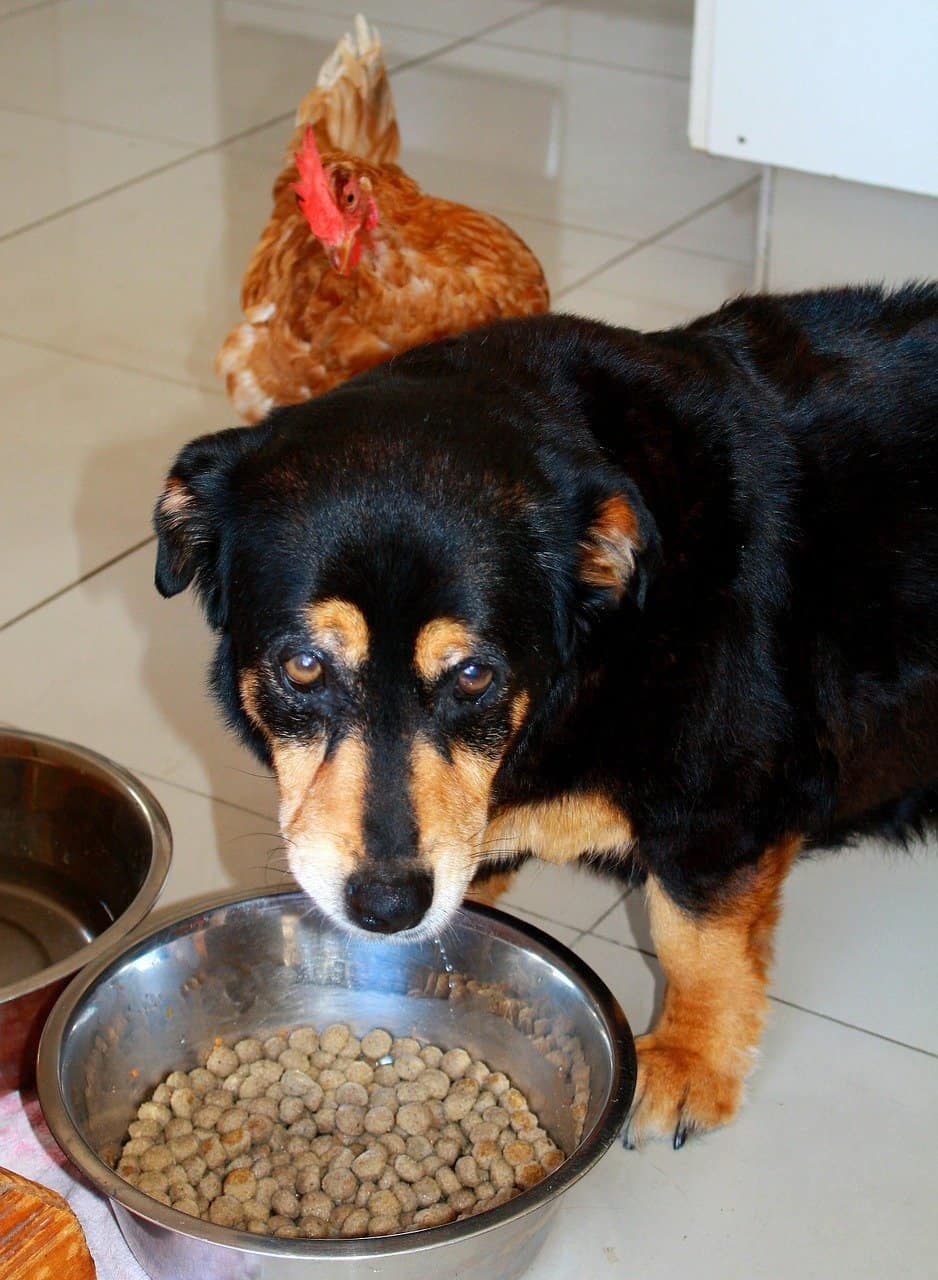Why is my old dog suddenly food-obsessed? What can be making my senior pet crave food all of a sudden, and how do I address it?
Excessive eating, or polyphagia, frequently happens in both young and old pets. With senior dogs specifically, there are quite a few causes for this type of behavior.
By far, the most common is a canine cognitive dysfunction, i.e., the pet is going through stages of “dog dementia,” and extreme cravings are just one of many symptoms.
Other causes of excessive eating include health conditions such as hyperthyroidism and Cushing’s disease.
Sometimes, your dog might also eat too much because of a negative reaction to its medication or inappropriate dietary choices.
Old Dog Suddenly Food-Obsessed. Likely causes
Senior dogs tend to exhibit strange behavior as they grow old. In that sense, they’re not all that different from us humans when we reach an advanced age.
However, we have to keep track of what they’re doing and find out why they behave this way. And there are plenty of senior pet quirks out there.
For example, I’ve met dozens of people who saw their old dog suddenly food-obsessed, constantly eating more and more. None of them knew how to help their pets with this issue!
So, today, I will help you find out why your own old dog is suddenly food-obsessed. We’ll go over the most likely causes and how you can help treat them.
Naming the Condition
Sudden food obsession in pets is called polyphagia. Now, I should point out that polyphagia appears in pets of all ages.
You won’t just see an old dog suddenly food-obsessed — plenty of pups and even healthy-looking adult dogs can go through this ordeal.
What Makes an Old Dog Suddenly Food-Obsessed?
The Wrong Diet
As a dog ages, its stomach can no longer process certain foods. Moreover, it needs other specific nutrients for its body to function properly.
For example, most senior dogs will have to eat foods that contain high-quality proteins.
In addition, they require bioavailable nutrients because they are easy to break down and convert into energy.
So, if you’re feeding it the wrong type of food, don’t be surprised to see your old dog suddenly food-obsessed and unable to stop eating.
It’s eating more than usual because the body is having difficulty extracting the nutrients it needs.
How to Deal With This Issue
There are several other telltale signs that your old dog’s diet needs to change. For instance, the dog might act lethargic, start to put on weight, vomit frequently, or have digestive problems.
In addition, its fur may lose its luster. If you see patches missing or the dog scratching more than usual, that can also be a sign of a poor diet.
As soon as you spot these signs, take the dog to a vet. Discuss the dog’s diet in detail and list all the food you’ve been giving it.
Based on the dog’s age and its current health condition, the vet will prescribe specific types of food that you’ll need to buy.
It’s a good idea to pay attention to your dog’s eating habits after the food change as well.
Canine Cognitive Dysfunction
Canine cognitive dysfunction or CCD is like the dog version of human dementia. As the dog grows older, it starts to lose some of its cognitive abilities, which results in behavioral changes.
Eating lots of food is just one of the possible symptoms. Others include forgetfulness, an increase in housebreaking accidents, anxiety, and different sleeping habits.
How to Deal With Canine Cognitive Dysfunction
CCD is quite common, but just like dementia, it doesn’t go away. As time goes on, your dog’s cognitive functions will continue to deteriorate due to old age.
However, you can alleviate the symptoms a bit. Vets usually prescribe Anipryl since it can reduce some of the effects of CCD and make your elderly canine’s life a little bit easier.
Medication Side Effects
It’s not uncommon for old dogs to be on medication for an existing condition. As they grow older, you will probably have to update the medication routine with new drugs.
At some point, that can lead to drastic changes in eating habits, including polyphagia.
Dealing With Medication Side Effects
Medications vary extremely, which is why it’s incredibly difficult to get a proper diagnosis for an eating disorder.
So, when you’re talking to your vet, you have to provide as many details as possible. Consider the following questions:
- Is your old dog suddenly food-obsessed after taking the new meds?
- Can it be a combination of two different types of medication, perhaps?
- Is it a reaction to the food that the dog is already eating every day?
The vet will assess the situation and let you know if you need to change your pet’s medication routine again. Still, it’s important that you don’t leave anything out.
Hyperthyroidism
Hyperthyroidism is not quite common in dogs. However, thyroid disorders, in general, tend to manifest in middle-aged and senior dogs the most.
This condition affects the dog’s thyroid gland, which is responsible for many bodily processes, including metabolism.
When this gland becomes enlarged, it starts producing hormones like thyroxine at an incredibly fast rate.
As a result, your old dog’s metabolism speeds up, and it starts craving food more than usual.
There are different indicators that can help you spot hyperthyroidism, with the most obvious one being a swollen thyroid gland.
Other symptoms include excessive thirst, a change in the dog’s breathing pattern, excessive urination, and hyperactive behavior.
How to Deal With Hyperthyroidism
Dealing with hyperthyroidism will depend on what caused it. Generally speaking, there are three different ways in which this problem manifests in old dogs:
- Overactive thyroid nodules
- Reaction to hypothyroidism meds
- A tumor
Sometimes, thyroid nodules can “work overtime” and produce extreme amounts of thyroxine. Luckily, you can treat this issue with proper medication.
Now, let’s say that your old dog has hypothyroidism, i.e., the thyroid gland can’t produce enough hormones.
When you treat your pet with proper medication, sometimes, there are side effects that actually match the symptoms of the exact opposite condition.
If that happens, talk it over with your vet and adjust the hypothyroidism therapy.
Finally, there’s the issue of a tumor pressing against the thyroid gland. If it’s small enough, a surgeon can remove it, or at least a part of it.
If they can’t do that, they will probably have to remove your pet’s whole thyroid gland.
Sadly, the tumor can sometimes take over the whole gland, so the vet won’t be able to remove it at all. That’s when you have to think about radioactive therapy.
Once your dog has received its treatment, you have to monitor its recovery at all times. In addition, the vet will probably prescribe a completely new diet for the dog.
Cushing’s Disease
Cushing’s disease also occurs frequently in old dogs. It’s a condition in which the dog’s pituitary gland releases too much ACTH, which then leads to a cortisol buildup.
Cortisol is a stress hormone, and when there’s too much of it, your dog’s body suffers from a whole list of serious problems.
So, if you notice that your old dog has suddenly become food-obsessed and is craving more food than usual, it might just be Cushing’s.
However, there’s a big problem with diagnosing this condition. Most of the symptoms match those of aging.
For example, your dog might be losing hair, have discolored skin, pant heavily, or drink a huge amount of water.
Every single one of these signs can point to both the side effects of old age and the early stages of Cushing’s disease.
How to Deal With Cushing’s Disease
When you take your furry friend to the vet, don’t be afraid to ask about Cushing’s. They can do a preliminary test on your pet and determine if there’s a cause for concern.
If the results point to Cushing’s, you’ll need to take your pet for an extensive low-dose dexamethasone suppression test, or LDDS.
The test isn’t cheap, but it will let you know if your senior dog has the disease or not.
Your dog can get Cushing’s from either a tumor or corticosteroid medication. If the tumor strikes the pituitary gland, you can’t remove it surgically.
The only solution is to use medication to provide the dog with some relief. However, if your pet has an adrenal tumor, surgery is an option, but only if the tumor has not metastasized.
Otherwise, pain relief medication is the only option.
Regarding corticosteroid medication, if your dog takes too much of it, its body can produce more cortisol than usual.
The solution is to wean your pet off the meds. The symptoms should slowly go away.
Stress and Habitual Eating
Stressful situations can affect dogs of any age. Maybe there’s a lot of noise in your home, or something (or someone) has mistreated your pet.
Whatever the case may be, stress and fear can make your dog eat more than it normally would.
On the other hand, your dog might just be eating a lot because you trained it that way.
A lot of pet owners don’t pay attention to the calorie intake, so they end up feeding their pets more often than necessary.
How to Deal With This Issue
If you can, try to find out the cause of your canine friend’s stress. However, do know that whether it’s stress or learned behavior, your vet might suggest behavioral therapy.
In short, you will have to feed your dog only a prescribed amount of food. That way, it will slowly get used to eating less, and the cravings will be gone.
Keep in mind that this method will require a lot of patience from you. After all, you’re quite literally teaching an old dog new tricks.
Final Thoughts
As I stated earlier, there are many reasons for this phenomenon. Some of them are quite mundane, while others are life-threatening and have no cure.
In the end, if your pet is craving more food, I hope this article can help you figure out the main cause.
No matter what makes your old dog suddenly food-obsessed, though, always remember to take your dog to an expert and to discuss every single possibility.


